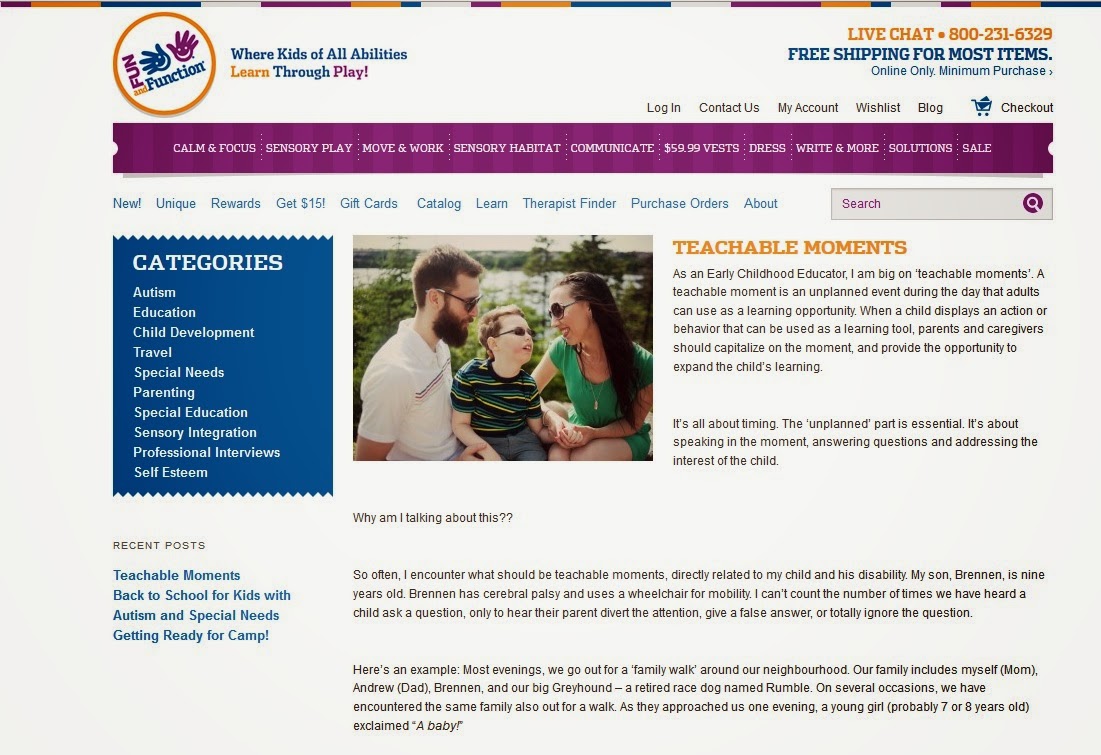It's all about timing. The 'unplanned' part is essential. It's about speaking in the moment, answering questions and addressing the interest of the child.
Why am I talking about this??
So often, I encounter what should be teachable moments, directly related to my child and his disability. I can't count the number of times we have heard a child ask a question, only to hear their parent divert the attention, give a false answer, or totally ignore the question.
Here’s an example: Most evenings, we go out for a ‘family walk’ around our neighborhood. Our family includes myself (Mom), Andrew (Dad), Brennen, and our big Greyhound – a retired race dog named Rumble. On several occasions, we have encountered the same family also out for a walk. As they approached us one evening, a young girl (probably 7 or 8 years old) exclaimed “A baby!”
Now.. I know she was talking about Brennen. They know she was talking about Brennen. Yet, the mother replies, "Oh, no that's a big dog!"
Lady.. your daughter is not stupid. She knows the difference between a dog and a baby! She was talking about my son. All you had to do was explain to her that he is a little boy in a wheelchair. She obviously has had no exposure to people in wheelchairs, and that’s ok. She’s young. But chances are, she will encounter individuals with various disabilities throughout her lifetime. It is your job to prepare her for this! A few brief words about how some people have trouble walking and need to use wheelchairs would suffice. Maybe explain to her that it does look a little bit like a stroller, but it is actually a wheelchair, for older children. It’s not rocket science.
I get that perhaps she felt embarrassed (it was obvious that we'd heard her child say "A baby!"), and maybe she didn't want us to feel bad, or perhaps she just didn't know what to say. But you guys, please don't lie to your children. Parents are (or should be) their child's greatest influence. They listen to what you say and they hold it to a high regard. They believe what you say is the truth. This lady implying to her daughter that Brennen was a dog is just confusing! Your kids are smarter than that. They deserve better than that.
Children will say funny things, and they will ask strange and often embarrassing questions, but that's all a part of childhood, and all a part of learning. It is our job to answer their questions truthfully, with as much or as little information necessary to satisfy their curiosity.
Some children have great questions! A little boy recently asked me “If Brennen is in a wheelchair, how does he get in bed?” Excellent question. I told him that “We help Brennen out of his chair, help him get his pajamas on and then tuck him into bed, just like your Mommy and Daddy tuck you in at bedtime!” He was happy with that answer, and went on to what he was previously doing.
Another little boy came over to Brennen in the swimming pool one day and asked how old he was, to which Andrew replied that he was nine. The boy thought for a minute and said “He’s small. Is he strong?” Great question. Andrew said “He’s probably not as strong as you are!”
A young girl came sauntering over shortly after and asked “What’s wrong with him? Is he tired?” Andrew calmly replied that he wasn’t tired, he was just relaxing in the water, to which the girl retorted, “Why is his mouth open?”
The little boy from earlier piped in and said quite matter-of-factly, “So he can breathe!”
I love that kid.
My point is that children are naturally going to be curious about anything that is 'different' or new to them. It is our job as parents to educate our children and to prepare them for life and the great big world out there. We must equip them with the tools and the language to be able to ask their questions without being offensive or rude.
When your child notices or asks questions about a person who has a disability, it is an opportunity for you to talk about individual differences. Your response will shape your child’s future attitudes and actions toward people who live with disabilities. Explain that there are actually lots of ways that people are different, but there are also many ways that they are the same.
Teaching your child to be respectful and inclusive of all people is one of the greatest gifts you can give them. Treating others as you would like to be treated is always good advice.
-Julie B
Check out their catalog and website devoted to making sure children with special needs get the tools they need to succeed. www.funandfunction.com



No comments:
Post a Comment